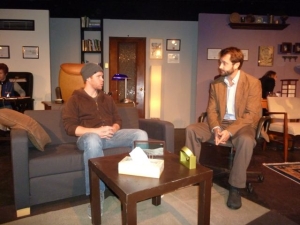Alumnus’ Play Challenges Public Perception of Social Workers
May 20, 2013 / by Cursta McCullom- Alumni
As Steven sits in an office with colorful furniture and regularly used incense, his therapist Moira tells him, “We all make choices. It doesn’t mean that one choice is right and the other is wrong. But it does mean that we have to live with the choices we’ve made and the impact those choices have on others.”
This cause and effect is a theme that runs throughout “Therapy,” a play written and directed by USC School of Social Work alumnus Jeff Bernhardt that shows how the line between professional and personal issues can become blurry.
Other characters include Lance, a depressed man in his 20s who masks his pain with sarcasm, and meets with Steven for therapy just to spite his parents with the bill. Somewhat new to private practice, Steven struggles to connect with Lance and airs his grievances and childhood wounds to Moira, an earth mother who meditates in her free time. The last of the play’s therapists is Sandra, a “consummate professional” who seems to have mastered leaving her personal problems at the door.
Bernhardt, MSW ’94, said he wanted to humanize the counseling profession through his characters.
“It was very important for me to present it in a realistic way,” Bernhardt said. “Oftentimes, the only experience people have with therapy is through the media, which doesn’t show what it’s really like to be a therapist or what issues come up.”
“Therapy” had nine showings over three weekends in March at the Secret Rose Theatre in Los Angeles. Sitting in the audience on opening night was Robin Siegal, an adjunct lecturer at the School of Social Work. After seeing the play, Siegal decided to sponsor it through her organization California Psych Resources, which promotes creative and applicable training for professionals in continuing education.
“This was the first time I saw a play where social workers were therapists in private practice. That usually isn’t how we’re portrayed in the media,” Siegal said. “Bernhardt’s play helps demonstrate to the public that we’re capable of more things than being foster care workers.”
Bernhardt, who has worked as a social worker serving families and college students, said the play stems from the questions and experiences he was challenged with after the suicide of one of his former clients. As he worked through his thoughts and unresolved feelings from the incident, he started writing “Therapy.”
His emotional connection to the play can be seen in how his characters deal with abandonment, hopelessness and anger in a way the audience can relate to. Moira is a nurturing therapist in her office, but she struggles with the guilt of being unable to help her mother suffering from dementia because they live in different states. Just as the play isn’t only about therapy, Bernhardt’s characters aren’t only therapists – they are also people with their own concerns.
The National Association of Social Workers also applauded “Therapy” and chose to recognize Bernhardt with the Social Work Image Award. The award is given to those who have advanced the profession through their work. Bernhardt said he was honored to receive the award because authentically representing social workers was important to him when creating the play.
“While I did not write "Therapy" with the goal of promoting a positive self-image of social workers, it was very important to me to portray the characters not as clichés or as stereotypes but as human beings with professional values and personal struggles,” Bernhardt said. “I got powerful reactions from people who never really understood what it was like to be a therapist, and the people who were therapists said they felt very validated by the way it was presented.”
Currently, Bernhardt works as a Jewish educator and communal professional, but devotes most of his time to his writing career. He previously wrote the play “Mixed Blessings” and published the book On Sacred Ground: Jewish and Christian Clergy Reflect on Transformative Passages from the Five Books of Moses.
Bernhardt said his experience at USC greatly influenced “Therapy.”
“In writing and thinking about the play, I called upon my education, my internships and my work after I graduated,” Bernhardt said. “Even though my schooling was 20 years ago, it was the foundation for everything that came later and everything that I’ve done since.”
To reference the work of our faculty online, we ask that you directly quote their work where possible and attribute it to "FACULTY NAME, a professor in the USC Suzanne Dworak-Peck School of Social Work” (LINK: https://dworakpeck.usc.edu)
